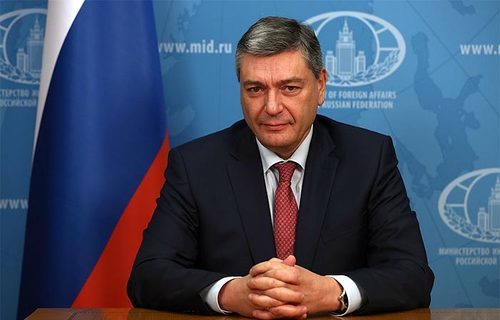Japan's remilitarization process is of concernMoscow.
February 10th. INTERFAX - The draft Russian-Japanese roadmap has lost its relevance, but the Russian side does not close the doors to Japanese investors who want to work with Russia, Deputy Foreign Minister Andrei Rudenko said in an interview with Interfax.
"Over the past year, Japan has imposed 17 "packages" of personal and sectoral "sanctions" against Russia, disavowed the "Eight-point Cooperation Plan" proposed by Shinzo Abe at the time. Naturally, in such conditions, the draft Roadmap has lost its relevance," the deputy minister said.
He noted that "the politically engaged rash actions of Fumio Kishida's administration have seriously undermined Tokyo's reputation as a reliable and promising business partner."
"But the doors for investors willing to cooperate from the Land of the Rising Sun remain open," Rudenko stressed.
He added that "due to the direct and indirect impact of anti-Russian sanctions, unprecedented political and psychological pressure from the Japanese authorities, a number of large Japanese companies have suspended operations in our country or completely left the market."
"The vacated economic niches are already occupied by domestic and foreign entrepreneurs. Some Japanese businessmen sell assets to their Russian partners, apparently with an eye to return to Russia again after some time," Rudenko continued.
"Nevertheless, according to our estimates, a significant number of firms from Japan are trying to adapt to the new conditions and continue to work. A typical example is the Japanese participants in oil and gas projects in the Sakhalin region," he stressed.
In May 2020, the leaders of Russia and Japan agreed to develop a roadmap to enhance Russian-Japanese trade and investment cooperation. This document, as Rudenko recalled, was supposed to include a set of practical steps and specific tasks for the governments and business circles of the two countries.
Speaking about whether the Russian side considers Japan's plans to increase defense spending in the coming years as a threat to its security, the deputy minister said: "The process of remilitarization of Japan that has begun is of serious concern."
"The Kishida administration, apparently, has taken a course to dismantle the pacifist provisions of the constitution, actively build up the military budget and use methods of pressure, including force, in imposing its approaches to global and regional issues. The statements of both the Japanese Prime Minister himself and representatives of his government on international platforms, including the UN rostrum, serve as confirmation," the deputy minister said.
"In such rhetoric we hear an open call for a revision of the foundations of the existing post-war world order. In this regard, we constantly warn Tokyo publicly and through diplomatic channels about the need to strictly observe the Charter of the United Nations, the provisions of which are entirely based on the results of the Second World War. We will continue to seek their recognition by the Japanese side in full," Rudenko added.

